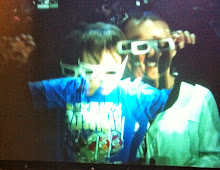
TODAY'S ACTIVITIES:
- Hardware Busy Board
- Dusting
- Bead Stringing
- Transferring
- Sweeping

The subject comes up because my son approached me a couple of times yesterday morning to say that his friend did this or his friend did that. My initial (unexpressed) reaction was one of irritation; having no desire to abide his tattling, I wanted to tell Parker to deal with the situation himself. When interacting with my son, though, I have started to use a time-delay system, sort of like the FCC's broadcast delay that's meant to catch celebrities' curse words. I don't curse, but my initial response to my son can sometimes be reactionary and self-centered. A ten-second delay is usually enough of a pause for me to remember to take myself out of the equation, so that I can actually listen to my son without a "but how is this going to affect ME?!" bias. Once I could hear Parker objectively, I realized that he wasn't so much tattling as asking me, his parent/teacher, for guidance. If he could have been more eloquent, he would have said, "My friend did such and such. Is this OK? If it's not OK, how should I respond?" I'm 33, and I still at times have social interactions that cause me to ask those questions. Existing within a society can be tricky, especially since we're not always on our best behavior. Preschoolers have notoriously little impulse control, possess a tenuous (at best) grasp of morality and have only just begun to figure out the codes of civility. We should expect them to have a hard time playing nice with their friends, and we should also expect to have to exert some energy ourselves when certain situations arise. One of our most important jobs as parents and educators is to provide young children with a moral framework that will serve them for the rest of their lives. When our kids come up to us and say, "So-and-so did this," they aren't tattling; they're providing us with teaching opportunities. I'm not saying that we should stand up and intervene; angrily shouting, "Hey, Johnny! Stop throwing sand at my kid!" won't teach anybody anything. We should sit down and explain, instead, giving our children the guidance they're seeking. When a child tattles, he's looking for confirmation that something that happened is or isn't OK, and he's asking for help formulating an appropriate response. It's not as easy as waving a dismissing hand and saying, "Work it out between yourselves," but I think it's the more considered course of action.


No comments:
Post a Comment